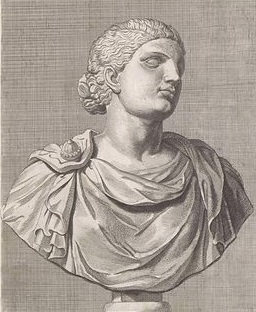Related Research Articles

The gens Livia was an illustrious plebeian family at ancient Rome. The first of the Livii to obtain the consulship was Marcus Livius Denter in 302 BC, and from his time the Livii supplied the Republic with eight consuls, two censors, a dictator, and a master of the horse. Members of the gens were honoured with three triumphs. In the reign of Augustus, Livia Drusilla was Roman empress, and her son was the emperor Tiberius.

The gens Julia was one of the most ancient patrician families in ancient Rome. Members of the gens attained the highest dignities of the state in the earliest times of the Republic. The first of the family to obtain the consulship was Gaius Julius Iulus in 489 BC. The gens is perhaps best known, however, for Gaius Julius Caesar, the dictator and grand uncle of the emperor Augustus, through whom the name was passed to the so-called Julio-Claudian dynasty of the first century AD. The nomen Julius became very common in imperial times, as the descendants of persons enrolled as citizens under the early emperors began to make their mark in history.
The gens Pontia was a plebeian family at ancient Rome. Few members of this gens rose to prominence in the time of the Republic, but the Pontii flourished under the Empire, eventually attaining the consulship. Pontius Pilatus, as prefect of Judaea, is known for his role in the execution of Jesus.

Calpurnia was either the third or fourth wife of Julius Caesar, and the one to whom he was married at the time of his assassination. According to contemporary sources, she was a good and faithful wife, in spite of her husband's infidelity; and, forewarned of the attempt on his life, she endeavored in vain to prevent his murder.

The Julii Caesares were the most illustrious family of the patrician gens Julia. The family first appears in history during the Second Punic War, when Sextus Julius Caesar was praetor in Sicily. His son, Sextus Julius Caesar, obtained the consulship in 157 BC; but the most famous descendant of this stirps is Gaius Julius Caesar, a general who conquered Gaul and became the undisputed master of Rome following the Civil War. Having been granted dictatorial power by the Roman Senate and instituting a number of political and social reforms, he was assassinated in 44 BC. After overcoming several rivals, Caesar's adopted son and heir, Gaius Julius Caesar Octavianus, was proclaimed Augustus by the senate, inaugurating what became the Julio-Claudian line of Roman emperors.

Julia was the daughter of Roman dictator Julius Caesar by his first or second wife Cornelia, and his only child from his marriages. Julia became the fourth wife of Pompey the Great and was renowned for her beauty and virtue.
Lucius Domitius Ahenobarbus, consul in 54 BC, was an enemy of Julius Caesar and a strong supporter of the aristocratic (Optimates) party in the late Roman Republic.

Cornelia was the first or second wife of Julius Caesar, and the mother of his only legitimate child, Julia. A daughter of Lucius Cornelius Cinna, Cornelia was related by birth or marriage to many of the most influential figures of the late Republic.
The gens Octavia was a plebeian family at ancient Rome, which was raised to patrician status by Caesar during the first century BC. The first member of the gens to achieve prominence was Gnaeus Octavius Rufus, quaestor circa 230 BC. Over the following two centuries, the Octavii held many of the highest offices of the state; but the most celebrated of the family was Gaius Octavius, the grandnephew and adopted son of Caesar, who was proclaimed Augustus by the senate in 27 BC.
The gens Pinaria was one of the most ancient patrician families at Rome. According to tradition, the gens originated long before the founding of the city. The Pinarii are mentioned under the kings, and members of this gens attained the highest offices of the Roman state soon after the establishment of the Republic, beginning with Publius Pinarius Mamercinus Rufus, consul in 489 BC.
The gens Otacilia, originally Octacilia, was a plebeian family at ancient Rome. The gens first rose to prominence during the First Punic War, but afterwards lapsed into obscurity. The first of the family to obtain the consulship was Manius Otacilius Crassus, in 263 BC.

The gens Lollia was a plebeian family at Rome. Members of the gens do not appear at Rome until the last century of the Republic. The first of the family to obtain the consulship was Marcus Lollius, in 21 BC.

The gens Antistia, sometimes written Antestia on coins, was a plebeian family at ancient Rome. The first of the gens to achieve prominence was Sextus Antistius, tribune of the plebs in 422 BC.

The gens Axia, also spelled Axsia, was a plebeian family at Rome during the final century of the Republic and the beginning of the Empire. The gens does not appear to have been particularly large or important, although at least some of the family were reasonably wealthy.
The gens Actoria was an obscure Roman family of the late Republic or early Empire. The only member of this gens mentioned in history is Marcus Actorius Naso, whom Suetonius quotes as an authority on the life or times of Caesar. Other Actorii are known from inscriptions.
Lucius Julius Caesar was a politician in the late Roman Republic. He was the son of Lucius Julius Caesar, and a member of the powerful patrician family Julii Caesares. His father was a first cousin of Julius Caesar.
Julia, also known as Julia Major and Julia the Elder, was the elder sister of Julius Caesar, the Roman dictator.
The gens Helvia was a plebeian family at ancient Rome. This gens is first mentioned at the time of the Second Punic War, but the only member of the family to hold any curule magistracy under the Republic was Gaius Helvius, praetor in BC 198. Soon afterward, the family slipped into obscurity, from which it was redeemed by the emperor Pertinax, nearly four centuries later.
The gens Lucceia, occasionally Luceia or Luccia, was a plebeian family at Rome, which flourished during the final century of the Republic and under the early Empire.
The gens Mettia, also written Metia, was a plebeian family at ancient Rome. Few members of this gens occur in history, and none attained the higher offices of the Roman state under the Republic. Several Mettii rose to prominence in imperial times, with at least three obtaining the consulship in the late first and early second century.
References
- ↑ Suetonius, Julius Caesar 9, 52
- ↑ Mellor, Ronald (2004). Historians of Ancient Rome: An Anthology of Major Writings. Routledge. p. 350. ISBN 0-415-97108-X.
- ↑ Deutsch, Monroe E. (1922). "Notes on Suetonius "Iulius" 52.1". The Classical Journal. Classical Association of the Middle West and South. XVII: 161–162. Retrieved 2009-04-11.
- ↑ Smith, William (1867). "Actorius Naso, M.". In Smith, William (ed.). Dictionary of Greek and Roman Biography and Mythology . Vol. 1. Boston, MA. p. 17.
![]() This article incorporates text from a publication now in the public domain : Smith, William, ed. (1870). "M. Actorius Naso". Dictionary of Greek and Roman Biography and Mythology . Vol. 1. p. 17.
This article incorporates text from a publication now in the public domain : Smith, William, ed. (1870). "M. Actorius Naso". Dictionary of Greek and Roman Biography and Mythology . Vol. 1. p. 17.